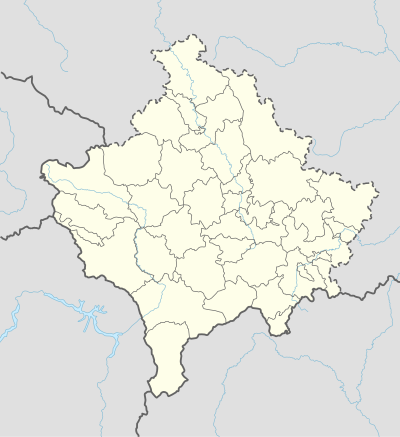Krajkovë
Krajkova or Krajkovë is a village in the municipality of Glogovac in Kosovo.
Krajkovë Krajkova | |
|---|---|
Village | |
 Krajkovë Location in Kosovo | |
| Coordinates: | |
| Location | |
| District | Pristina |
| Municipality | Glogovac |
| Population (2011)[1] | |
| • Total | 1,181 |
| Time zone | UTC+1 (CET) |
| • Summer (DST) | UTC+2 (CEST) |
Krajkova is bordered by villages: Llapushnik, Domonek, Shtrubulovë and Zabel I Ulët, and very close to Drenas, 5 km west. Krajkova is known as an ancient settlement where the archive documents of the former Ottoman Empire and the Austro-Hungarian Empire also shown. An Argument might be that the Mosque of Krajkovë[2] is the second- most ancient built Mosque in Kosovo, in the time of the Ottoman Empire, in 1480.
The settlements are along Kosovo's central mountain "Mali Kosmaç" or Mount Kosmaç, as an important touristic and geostrategic position for the region. The peak of Kosmaçi is 1,031 m high. Krajkova is populated with ethnic Albanians, The village has approximately 132 houses and over 1818 inhabitants,[3] and the birthplace of the great Kosovan comedian, Ibrahim Krajkova. Krajkova is also known as the resistance land of many wars over the centuries, especially during the Kosovo War where many residents were ranked in the line of the Kosovo Liberation Army, with many historic figures, like: Dr.Hafir Shala, National Heroes: Luljeta Shala, Gani Elshani, Vehbi Hoxha Mehdi Hoxha.
Krajkova is an agricultural-based, rural village with wheat and maize as the primary crops. The Cattle Farm in Krajkovo is now utilised, making possible for a lot of residents to work there.
The village has a primary school, named after the National Hero:"Gani Elshani"[4] with about 400 students, a good infrastructure and a great potential to invest on the fields, like: Tourism, Agriculture and Aviation.
There are more than 8 neighborhoods, like : Podrimqaku, Shala, Hoxha, Elshani, Neziri, Buzaku, Zeneli and Imeri neighborhood.
Notes
- Kosovo is the subject of a territorial dispute between the Republic of Kosovo and the Republic of Serbia. The Republic of Kosovo unilaterally declared independence on 17 February 2008, but Serbia continues to claim it as part of its own sovereign territory. The two governments began to normalise relations in 2013, as part of the 2013 Brussels Agreement. Kosovo is currently recognized as an independent state by 97 out of the 193 United Nations member states. In total, 112 UN member states recognized Kosovo at some point, of which 15 later withdrew their recognition.
References
- 2011 Kosovo Census results
- "Google". www.google.com. Retrieved 2017-05-12.
- http://pop-stat.mashke.org/kosovo-census-ks.htm
- "SHFMU "GANI ELSHANI" KROIKOVË". www.facebook.com. Retrieved 2017-05-12.